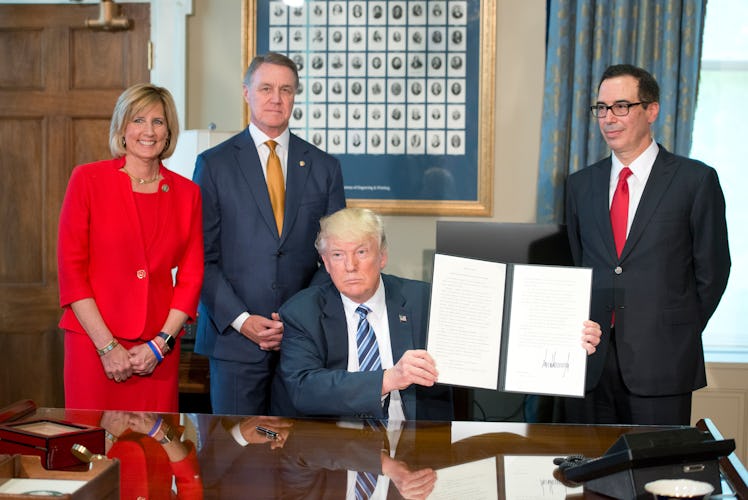
Trump Just Made This Major Change To Obamacare & Democrats Are Calling It "Sabotage"
On Tuesday, Oct. 10, President Donald Trump said he would begin using the "power of the pen" to bring major changes to Obamacare, without the help of Congress. Three days later, the president has brought those words to fruition with two major decisions that his administration says are intended to fix a broken health care law, while Democrats accuse the president of "sabotaging" Obamacare by ending cost-sharing subsidies. For many, the Dems' accusation might be the question: What are cost-sharing subsidies?
The answer is crucial to the conversation about the current state of Obamacare — the law otherwise known as the Affordable Care Act (ACA) — and the state of Obamacare in the future.
The Purpose Of Cost-Sharing Subsidies
Cost-Sharing Subsidies (CSR) are payments that the executive branch — i.e. Trump's administration and former President Barack Obama's administration before him — hand out to health insurance companies across the nation.
The Obama administration paid out CSRs as a way to compensate for losses that insurance companies may have taken on by covering more people.
Here's the perspective from the insurance industry: Covering many more people, at a low cost, even those with pre-existing conditions — i.e. conditions that, among other things, could result in high-cost medical bills that insurance companies have to pay — is a responsibility that ultimately requires those companies to spend more money.
As an incentive to keep the costs of their plans plan and make healthcare available to as many people as possible, the Obama administration saw it fit pay CSRs to make the Affordable Care Act possible.
Without the payments, there are fears that insurance companies will raise premiums and deductibles even higher, which in turn could result in it being more difficult for low-income families to afford health insurance through Obamacare.
CSRs are paid out by the executive branch on a month-to-month basis, and were estimated by the bipartisan Congressional Budget Office (CBO) to cost $7 billion throughout 2017.
What Trump Will Do To CSRs
In the past, President Trump has flirted with the idea of ending the payments. On Thursday night, however, Politico reported that the administration has come to a final decision: It will stop paying out cost-sharing reductions.
In a statement reported by Politico, White House Press Secretary Sarah Huckabee Sanders said,
Based on guidance from the Department of Justice, the Department of Health and Human Services has concluded that there is no appropriation for cost-sharing reduction payments to insurance companies under Obamacare. In light of this analysis, the Government cannot lawfully make the cost-sharing reduction payments … The bailout of insurance companies through these unlawful payments is yet another example of how the previous administration abused taxpayer dollars and skirted the law to prop up a broken system.
Crucially, cost-sharing reduction payments — in their current form at least — are not a feature of the actual law formed by Obamacare, which intended for Congress to designate (or, "appropriate") a certain amount of money to reimburse insurance companies.
In the absence of Democrats and Republicans in Congress actually coming together to decide a budget that appropriates a type of cost-sharing reduction, former President Obama took it upon himself to work around Congress to make the payments himself, which opponents of CSRs argue is unconstitutional.
Now, President Trump is doing something similar. In the absence of Congress finding a permanent solution to replacing the Affordable Care Act with a different law, the administration took two measures this week by itself to make changes to Obamacare.
One of those changes is, of course, ending CSRs, which Senate Minority Leader Chuck Schumer called a "spiteful" act.
The other change was an executive order that loosens Obamacare regulations, which House Minority leader Nancy Pelosi referred to as "sabotage."